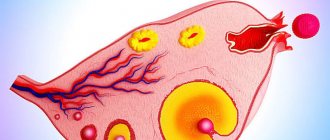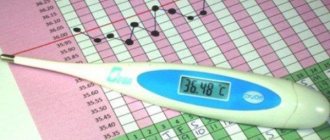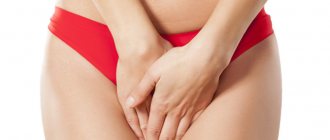On the eve of menstruation, many representatives of the fairer sex notice that they begin to freeze. There are several explanations why a woman gets chills before her period. Various factors can provoke an increase or decrease in body temperature, resulting in discomfort in the form of a feeling of cold. Basically, the reasons why it’s cold on the eve of menstruation go away on their own in the first days of a new cycle and do not require treatment.
Physiological reasons
In the last days of the menstrual cycle, body temperature fluctuates, which is why it begins to freeze.
An increase or decrease in temperature depends on ovulation: before and after this process, the measurement results are lower, and during the time they are higher. As a result of such changes, before the onset of menstruation, a woman develops a feeling of chilliness and cold.
Another physiological condition that affects the feeling of chilliness during menstruation is an increase in the level of progesterone produced. This hormone affects thermoregulation processes in the body, increasing the temperature in the last days of the menstrual cycle.
These physiological factors cause temperature changes before menstruation, as a result of which the skin turns pale and trembling appears in the muscles. In some cases, with a strong impact on thermoregulation processes, a girl’s lips may turn blue.
The listed symptoms go away on their own with the onset of the next phase of the menstrual cycle, but provided that the body temperature does not rise above 37.6 degrees - this is a sign of pathology and requires contacting a doctor.
To know exactly what happens to a woman’s body at each phase of the menstrual cycle, we recommend reading additional information on this topic.
Premenstrual syndrome or pregnancy?
Some symptoms of PMS are similar to those of pregnancy (see). After conception, the content of the hormone progesterone increases in a woman’s body, which also occurs during PMS, so the following symptoms are identical:
- fast fatiguability
- breast swelling and tenderness
- nausea, vomiting
- irritability, mood swings
- lower back pain
How to distinguish pregnancy from PMS? Comparison of the most common symptoms of premenstrual syndrome and pregnancy:
| Symptoms | Pregnancy | Premenstrual syndrome |
| accompanies the entire pregnancy | with the onset of menstruation the pain goes away |
| the attitude towards food changes, you want inedible, salty, beer, things that a woman usually doesn’t like, the sense of smell is greatly heightened, ordinary smells can be very irritating | may crave sweet and salty foods, sensitivity to smells |
| only in later stages | May have lower back pain |
| starts 4-5 weeks after conception | can appear either immediately after ovulation or 2-5 days before menstruation |
| mild, short-lived pain | individually in each case | |
| frequent mood swings, tearfulness | irritability |
| Maybe | No |
| from 4-5 weeks after conception | possible nausea, vomiting |
The signs of both conditions are very similar, so it is not easy to understand what exactly is happening in a woman’s body and distinguish pregnancy from PMS:
- The easiest way to find out what causes poor health is to wait until your period starts.
- If the calendar is already late, you should take a pregnancy test. A pharmacy test will give reliable results only if menstruation is delayed. It is sensitive to the pregnancy hormone (hCG) excreted in the urine. If you don’t have the patience and nerves to wait, you can take a blood test for hCG. It shows almost one hundred percent results on the tenth day after conception.
- The best option to find out what is bothering you - PMS syndrome or pregnancy - is to visit a gynecologist. The doctor will assess the condition of the uterus and, if pregnancy is suspected, prescribe an ultrasound.
When to see a doctor
If the manifestations of premenstrual syndrome significantly reduce the quality of life, affect the ability to work and are of a pronounced nature, treatment cannot be avoided. After a thorough examination, the doctor will prescribe drug therapy and give the necessary recommendations to alleviate the syndrome.
Atypical form of PMS
Chills are caused by an atypical form of premenstrual syndrome (PMS). There are 3 types of this phenomenon, but a girl can freeze only with one of them: hyperthermic. It is characterized by an increase in body temperature before menstruation to 38 degrees. With the onset of menstruation, this figure drops.
This phenomenon is associated with an increase in progesterone levels on the eve of critical days and its decrease when bleeding occurs. In this case, the woman shudders before her period due to an increase in temperature.
How to help yourself at home
If no serious problems have been identified, and the increase in temperature occurs from a normal reaction to the onset of menstruation, in this case you can help yourself a little. Follow these simple steps:
- move more. A little physical activity will add endorphins to the blood. This will improve your mood and remove weakness;
- take a shower. Cool water can give strength to the body and improve mood;
- eat plant foods. During your period, you should not drink alcohol, and also not eat fried, spicy, or fatty foods. Eat fruits and vegetables;
- sleep ok. A woman should sleep at least eight hours a day;
- regulate loads. This applies not only to exercise, but also to hot temperatures. At this time, do not visit saunas and baths, and do not take hot baths;
- drink tea instead of coffee. Caffeine has a bad effect on a woman’s body during menstruation;
- control the use of medications. Many doctors advise drinking soothing teas at this time. But first, it’s better to ask your doctor for advice.
A large number of women can feel chills. It may be due to ovulation, the imminent arrival of menstrual periods, as well as changes in the level of progesterone in the blood. But the most correct decision in this situation would be to consult a gynecologist.
How to detect amenorrhea? Types and symptoms of the disease Symptoms of pain in the first days of menstruation How to calculate on what day after menstruation ovulation will begin Causes, symptoms, types of diagnosis and treatment of uterine adenomyosis
Inflammatory diseases
The appearance of chills during menstruation can be caused by inflammation in the genital area. In such conditions, body temperature rises significantly: it exceeds 37.6 degrees. Among the main reasons for the appearance of fever on the eve of menstruation are:
- Inflammation and endometritis in the uterine cavity - with an infectious lesion of the mucous membrane of the organ. The inflammatory process at the end of the cycle appears against the background of weakened immunity, which is why pathogenic microorganisms begin to multiply more actively. Symptoms of the pathology: constipation, pain in the lower abdomen and when urinating, the appearance of purulent or yellowish discharge from the vagina. During a gynecological examination, an enlarged uterus is noted.
- Adnexitis is an inflammatory process in the appendages. With this pathology, the temperature can rise to 40 degrees. In this case, nausea, vomiting, increased sweating, and weakness may occur. The woman also begins to feel cold. The pain that appears in the lower abdomen radiates to the legs.
If a girl has problems related to gynecology, chills before menstruation, she urgently needs to consult a doctor to diagnose the causes of pathological symptoms. If you do not undergo the necessary treatment in a timely manner, reproductive function may be impaired.
First aid
In cases where it has been determined that an increase in temperature is a natural reaction, but at the same time the woman feels unwell and is shivering, then with the help of simple actions it is possible to bring her state of health back to normal. To do this you need:
- Move a lot. Don't lie in one place. An active person has a greater concentration of endorphins in the blood, which fight fatigue and improve mood.
- Take a shower with cool water. This will activate the body, add strength and invigorate.
- Give preference to products of plant origin. During your period, avoid drinks containing alcohol, as well as fatty, spicy and spicy foods. It is better to replace coffee with weak tea, since caffeine excites the nervous system.
- Your rest should be at least 8 hours a day. Sleep will help restore strength and improve your mood.
- Control temperature and physical activity. Do not overwork; visiting saunas and hot water baths is contraindicated.
You can improve your health with the help of preventive medications. For example, Chinese lemongrass or eleutherococcus. But before taking the medicine, consult your doctor about this issue.
Women should remember that any symptoms during menstruation are an indicator of her health. Changes in the menstrual cycle can indicate many ailments, even those that are not gynecological manifestations.
In any case, there is no need to panic. Monitor your condition. If your period starts on time and your temperature does not exceed 37.4 degrees, then there is no reason to worry. It is worth paying attention to unusual symptoms and discussing the problem with your doctor. A specialist will help identify the causes of changes occurring in the body and give recommendations on how to eliminate them.
Anemia
Anemia can cause a condition where a woman's muscles tremble during her period. In the presence of such a pathology, weakness and chills occur systematically - regardless of the cycle. The situation can worsen on the eve of menstrual bleeding, when PMS appears. In this case, it not only freezes, but also shakes.
A reduced level of hemoglobin provokes rapid fatigue and weakness. Because of this, under the influence of an increase in the volume of progesterone, the body’s thermoregulation process is disrupted, and the woman becomes very cold.
Other factors
A woman gets chills not only for these reasons, but also under the influence of factors such as:
- emotional stress;
- hormonal disorders;
- increased blood pressure;
- the period preceding menopause.
If body temperature rises to non-critical levels and decreases with the onset of menstruation, chills are a physiological reaction of the body and do not require treatment. If a woman feels cold, severe temperature changes are observed, or symptoms of any pathology appear, it is necessary to consult a doctor.
Chills without fever
Chills, as noted, are a subjective physiological process. The reason for this is related to the need to maintain thermal balance. The appearance of trembling is not necessarily caused by a jump in body temperature. Causes of chills without fever:
- stress;
- emotional stress;
- hormonal disbalance;
- increased blood pressure;
- menopause
The female body is extremely susceptible to stress. Constant loads and tension can cause tremors before menstruation. Strong emotional stress, fear, and excitement change a woman’s condition. Doctors advise normalizing the status of the nervous system with sedatives. Tablets and herbal tinctures (valerian extract) have a calming effect.
Repeated occurrence of chills is sometimes caused by hormonal imbalance. The best solution is a consultation with an endocrinologist followed by a hormone test to possibly exclude thyroid diseases.
Chills with increased blood pressure are a sign of the development of hypertension. Ignoring the described condition can cause a hypertensive crisis or stroke. Women who feel chills when their blood pressure rises are advised to visit a doctor. The doctor will determine the diagnosis and prescribe appropriate medications.
Women experience climacteric syndrome in different ways. This is influenced by physiological and genetic factors. Many women entering menopause feel chills, they feel hot flashes and pressure surges. A gynecologist can advise the patient on medications that alleviate discomfort, of plant or synthetic origin.
However, we should not forget that chills can appear outside of menstruation against the background of hypothermia, poisoning, colds and more serious illnesses (malaria, Raynaud's disease).
If women stop shivering after their period, this is likely due to normalization of progesterone concentrations. Otherwise, the reasons are not related to gynecology.











